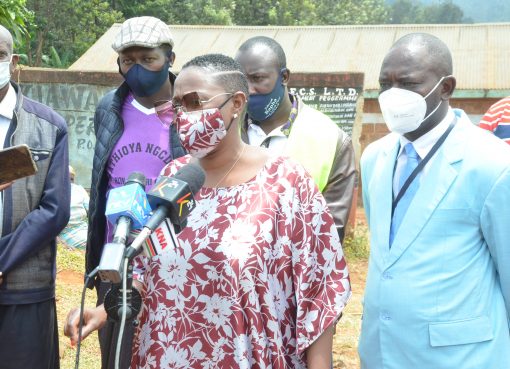Popularly known as Baringo’s poor and neglected squatters, Kampi Turkana residents in Marigat have been a graphic example of the country’s high level of poverty but thanks to the national government cash transfer fund progamme, this narrative is fast changing.
The living conditions in the informal settlement could be equated to the country’s sprawling Kibera and Mathare slums with no water, decent housing and sanitary facilities.
Children of the minority community who rely on menial jobs in the nearby farms within the famous Perkerra Irrigation Scheme resort to street life in Marigat town, some engaging in criminal and immoral activities thereby giving education a wide berth due to poverty.
“Before the introduction of this cash transfer funds, our life was extremely difficult for us in this village, our children were chokoras, they were not going to school but when we started receiving this assistance, life changed completely,” said Christine Loburi, a mother of nine.
Mrs Loburi who is one of the beneficiaries of the Orphans and Vulnerable Children kitty lauded the government for the cash transfer programme saying it has changed their lives positively.
Living at Kampi Turkana, one of Baringo’s poorest informal settlements on the outskirts of Marigat town, Mrs Loburi says before being enlisted in the programme they used to live in makeshift huts made of sticks and mud, resembling a traditional maize barn with no walls.
“But now, we have corrugated semi-permanent iron sheet houses, pit latrines and even enjoy clean water and are able to access medical care because of this assistance,” says Loburi.
Testifying of the success story of Inua Jamii, the elderly woman aged over 70 says they are now able to cater for basic necessities with the monies they get through the cash transfer funds.
“With this money, we have managed to educate our nine grandchildren who are orphans and also have been enabled to put a roof over their head courtesy of the cash transfer,” narrated the woman to Government spokesman Colonel (Rtd) Cyrus Oguna when he visited the sprawling slum in July to assess the impact of the programme.
The spokesman toured the informal settlement after holding his routine weekly national press briefing in Marigat town where he was focusing his address on Inua Jamii programme.
Mrs Loburi further narrated how the funds have helped them construct improved pit latrines, purchase a few goats, sheep and even hens to assist become food secure and improve nutritional conditions.
“Now our children are going to school, some have completed Form 4 while others have gone to the university thanks to the funds,” she says proudly.
According to Erick Kipyator, Marigat sub county social development officer, a total of 23,182 older persons with severe disability and orphan and vulnerable children in the county have received Sh 556 million in the past one year.
In Marigat alone, Kipyator says, Sh 91 million has been disbursed to 3,793 beneficiaries in the period under review with every beneficiary or household being paid Sh 2, 000 monthly.
Col Oguna said the government initiated the Inua Jamii project mainly to alleviate poverty among the poorest segment of the population with enrolment into the cash transfer going up every now and then.
This year alone, a total of Sh 26 billion has been set aside by Treasury for the programme up from Sh 16.6 billion 2018/2019 financial year, representing an increase in amount of 23.3 percent.
“The Inua Jamii fund specifically has been scaled up by 63 percent to benefit more than 1.3 million people in the entire country, that is, those living with severe disabilities, the elderly and orphans and vulnerable children,” Colonel Oguna stated..
He disclosed that there were 353,000 orphans and vulnerable children, 833,000 elderly persons and 47,000 persons with disabilities so far enrolled with the programme in the country.
The government spokesman notes that the cash transfer programme which captures Kenyans with special needs like the elderly above 70 years, widows and persons with severe disabilities was aimed at improving their living standards which will also promote the county’s socio-economic growth.
“The government is concerned with the life of every Kenyan and will continue to strive to make life better for every citizen,” adds the government spokesman.
Senior citizens who attended the press briefing praised the initiative saying it had reinvigorated their confidence in the society as they can cater for their basic bills and live in dignity like other Kenyans.
They however called for an increase in the amount per beneficiary saying the Sh 2,000 was very little to sustain the current challenging economic conditions.
Issues of biometric identification for the beneficiaries during payment was also cited as a major challenge with most of the elderly blaming the old age for their failing finger prints which had forced a number of them to miss on their dues or even spend nights out of their homes.
They also said they were traveling long distances to the financial institutions to access the cash, but the gender department said they were liaising with financial institutions to visit the beneficiaries in their nearest trading centres.
By Joshua Kibet
Sunday, December 22, 2024


